We are excited to announce the finalists in the Poetry, Short Fiction Collection, and Short Fiction categories of the 2016 Association for Mormon Letters awards. Middle Grade Novel and Young Adult Novel were announced previously, and we will be announcing the other category finalists over the coming week. Those categories include Comics, Creative Non-Fiction, Drama, Film, Novel, Picture Book, Religious Non-Fiction, and Video Series. The final awards will be announced and presented at the AML Conference at Utah Valley University on April 22. The finalists and winners are chosen by juries of authors and critics. The finalist announcements include blurbs about each of the books and author biographies, from the author and publisher websites, as well as a poem from each of the poetry collections.
Poetry
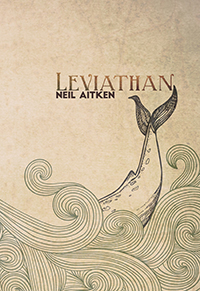 Neil Aitken. Leviathan. Hyacinth Girl Press.
Neil Aitken. Leviathan. Hyacinth Girl Press.
Babbage Attempting to Solve for the Unknown
Let x be the rain that falls in a year.
Let it be what overflows from the cisterns and wells,
from whatever vessels are set upon the walls of the city
or buried in its depths.
Even this water must have someplace to go.
All year it grows line after line parallel to the earth,
to the lip of crumbled brick, to the dark felt of shadow
that runs the length of a fallow field.
Let it be the solution to the bodies of grey-feathered birds,
to the cats thrown at you by children, to the withering snap
of ash and maple, to the flaming stacks of smoke,
to the count of scythes in a factory line.
Let it be what the rose seller dreams
on foggy Sunday mornings when the church bells
swing wide over the dim and eager graves, the stones
that mark where a wife and two children lie.
Let it be whatever and whomever will not awake again
in this house, though you count their breaths to the very last,
though the tables are full of their song.
Neil Aitken’s Leviathan offers to the extant literary conversation a new perspective of passion as it combines with the technological mind. While many contemporary essays tend to highlight the ways in which technology increases loneliness and separates us from one another, these poems manage to combine those elements in a way that brings us closer to Babbage and his loves, which in turn brings us closer to our own losses and loves.—Julianna DeMicco, Agape Editions blog
Neil Aitken is the author of The Lost Country of Sight (Anhinga, 2008), which won the Philip Levine Prize, and Babbage’s Dream (Sundress, 2017), which was a semi-finalist for the Anthony Hecht Prize. He is also the founding editor of Boxcar Poetry Review, as well as the curator of online resources Have Book, Will Travel and Chapbook Review. His work has been published in American Literary Review, Crab Orchard Review, The Dialogist, Ninth Letter, The Normal School, The Southern Poetry Review, and many other journals. A former computer games programmer, he has held fellowships from both Kundiman and Idyllwild, and recently completed a Ph.D. in Literature and Creative Writing at the University of Southern California where he wrote about nineteenth-century artificial intelligence, Frankenstein’s creature, Sherlock Holmes, and Babbage’s efforts to mechanized reason. He now lives in the Pacific Northwest where he builds websites, teaches online, and writes poetry and fiction
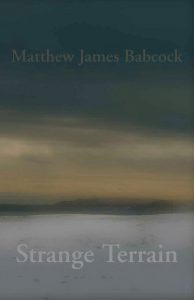 Matthew James Babcock. Strange Terrain. MadHat Press.
Matthew James Babcock. Strange Terrain. MadHat Press.
The Transient Rains of April
If nothing else, I have this: I once saved a girl’s life. Five years
back, before our son was born, I was walking a street that
had grown as familiar as your pulse. January. Twenty below.
Chestnut trees, stripped of their torches, hardened in the
fragile air. Crabapples blackened satchels of shriveled fruit. One
hundred and one mute crows whetted their feathers on the
bloodless sky. She wore frayed pajamas. Purple stripes. Her hair
bristled like the heart of winter. Her bare feet sloped down
driveway frost to the street. When she raised her arms to me, I
lifted the bundled cornstalks of her bones and took her to
the nearest house. You carry a stranger’s child the way you
would deliver a pillar of carved glass. The way you carry
the angel fresco dislodged from the cathedral arch of you
remaining days. I knocked on a screen door. An older girl
answered, examined us through the ragbag curtain of her bangs.
Her brown T-shirt bore a jaguar face with emerald eyes.
“That’s ours,” she said, pushing the door open. Then wump-
wump-wump-wump. The mother’s frantic stampede down
the stairs, her face an earthquake, and her arms gather the
loose laundry of her daughter’s soul to her breast. I walked
away, having learned something I would realize the day I stood
outside for the first time with our newborn son to taste the
glorious rain-gusts of spring: the faces of horror and ecstasy are
the same face. Later someone told me a black sickness had
stung the girl’s mother the previous October—stage four cancer
was the offhand report—and now her face is the only thing
I see, now that the earth has grown familiar as your pulse,
and I swing our baby boy in the deadly basket of my arms
under April’s unruly caravan of clouds, each boisterous plume a
mad crusade, the chill of fresh drops rallying blood in our
skin. I see the way she charged the threshold of her home,
snatched her golden hatchling from my outstretched arms,
and slammed the door as if I were not a hero but a terrible
disease.
Prepare yourself for sonnets and études, sestinas and sapphics. Prepare too for a rollicking good time. I love the daring range of these poems and Babcock’s nervy delivery—everyday experience shot through with awe and irony. Under each one should be written “I somehow survived.”—Lance Larsen, Utah Poet Laureate
Matthew James Babcock is Professor of English at BYU–Idaho in Rexburg. His debut chapbook, Points of Reference, is available from Folded Word. Winner of the 2016 Juxtaprose Poetry Prize, he also received a 2008 Dorothy Sargent Rosenberg Poetry Award, and has been thrice nominated for the Pushcart Prize. His creative nonfiction has been listed as “notable” in Best American Essays, and Press 53 selected his novella, He Wanted to Be a Cartoonist for The New Yorker, as a first-prize winner in its Open Awards Anthology. His academic work can be found in The Journal of Ecocriticism and Private Fire: The Ecopoetry and Prose of Robert Francis. His debut fiction collection, Future Perfect, is forthcoming from Ferry Street Books, and his debut essay collection, Heterodoxologies, will be released soon from Educe Press.
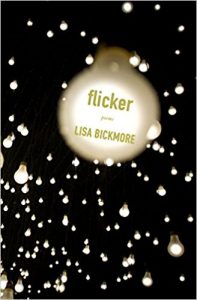 Lisa Bickmore. flicker. Elixir Books.
Lisa Bickmore. flicker. Elixir Books.
Concord
at leaf lift, fat fruit falling
to hand, bubble-headed bird
secrets glass-blown
hard seed heart, tongue-crushed
sweet bloom-end narcissi, sugar holding
scent-heavy fence brambler,
branch brawny shoulders,
twiggy hands, mouth of its violet
kiss—or even darker, a velvet sheen
pearl or nacre first snow-
gleam glove-cleared, rubbed,
thumb-polished, this
untended flower mouth bee-stung
berry, this love honey tumble
sweet thicket, autumnal
tendril, unmeditated
yield; this nonetheless late gleaning,
a transcendental century
and a half hence its cold Massachusetts
roots, declension of vitis Labrusca,
black fox grape the native wilding,
frontier now of my tillage, my
viticulture, my clean Ball jars,
my Northern thrift, my lyric
husbandry—plump bushels all this unbroken
afternoon sheared from vine and cane;
swoon plummy and beguiled
into my marveling palms—
Lisa Bickmore gives us a powerful new collection, in which ‘there are two lives, / the tranquil one and the conflagration.’ These are poems rich in both—and in their interplay—where, as the poet says, ‘Wildflower seeds exploded there / with the flicked matches I walked away from.’ What makes the poems in flicker such a rich experience is their fierce honesty as they demonstrate a willingness to alchemically enter the fire of one’s life in order to attain tranquility. Bickmore offers generative complexities of transformation, as when the cat in ‘Thaumaturge’ eats a bird, and ‘the bird’s heart [becomes] a power inside her.’ Read these poems with a sincere desire to connect with others and with the world. Taste these poems, savor them, and bring them—most dearly—into the body’s cells. They will reward you and become a power inside you too.—George Kalamaras, contest judge
Born in Dover, Delaware, Lisa Bickmore grew up living all over the United States and in Japan. She is the author of two books of poems: flicker, which won the 2014 Antivenom Prize from Elixir Press; and Haste (Signature Books, 1994). Her third book, Ephemerist, is forthcoming from Red Mountain Press in late summer, 2017. She earned a B.A. and an M.A. from Brigham Young University. Currently, she is a Professor of English at Salt Lake Community College, where she was the recipient of the SLCC Foundation Teaching Excellence Award in 2006.
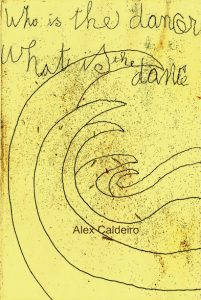 Alex Caldiero, Who is the Dancer, What is the Dance. Salt Front Press.
Alex Caldiero, Who is the Dancer, What is the Dance. Salt Front Press.
shadow
after shadow
and the sound
of river
sound of cricket
and if I use the same
word for some of these
very distinct phenomena
it is due to my poor
language skill
sound sound sound
Who is the Dancer, What is the Dance is based on a pocket journal that poet Alex Caldiero kept with him during a six-day river trip on the Colorado River through Cataract Canyon. In these poems, and the reproduced drawings that accompany, and often house, them, Caldiero explores how we simultaneously impinge upon, and give ourselves over to, a landscape. In these poems, our urban preconceptions falter and adapt to these places we call wild.
Born in the ancient town of Licodia Eubea, near Catania, Sicily, he immigrated with his family to the United States at age nine. Teacher, polyartist, sonosopher, Caldiero makes things that appear as language or pictures or music, or then again, as the shape of your own mind. He is a maker of text-sound and visual works, installations, and publications, including Sound Weave with Theta Naught (Differential Records), Poetry Is Wanted Here! (Dream Garden Press), Some Love (Signature Books), and Sonosuono (Elik Press). He previously won the AML Poetry Award in 1998 and 2013.
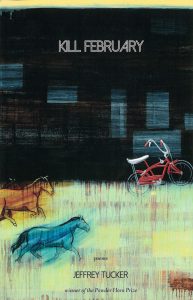 Jeffrey Tucker. Kill February. Sage Hill Press.
Jeffrey Tucker. Kill February. Sage Hill Press.
Crape Myrtle: A Voodoo Primer
Hattiesburg, Mississippi
They’re like nails, these flowers
their painted-on fuchsias frayed on edge
scratching at a sky unprepared. Fall back.
I pity the bee who chances a hand
pollinating these torches, stamens alight
with goldenrod sneer and sharpened,
filed to scratch anything—like a diamond,
like pave. They hang from their own weight
the stalks craning like old necks and, man,
when you’re too heavy for yourself, then you’re heavy.
See this bright fusillade, this sear. Once, hurried
I brushed my elbow against its bundle burst—
never mind how quickly, how like floss it first felt—
it burned three days, the flesh charred,
the wound at night glowing pink.
After years of burns and sunspots can I advise:
Don thick gloves. Take cuttings with a silver knife
or the stems won’t relent. For enemies
place bunches under their porches
and no friend will cross their threshold
only salesmen and missionaries. For the dead
plant cuttings halfway between coffin and ground:
the skeleton will rise, dance under the next new waxing.
For lovers, keep it far away, because no one
can compete with that heat. It’ll run you out of town.
Paradise? Look around. It’s vicious out here.
What Jeffery Tucker’s book of poems provides us with, in the face of an increasingly volatile environment is a focus on now. How do we best live now (which is truly the only thing we are granted) even while we are observant, and in acknowledgment of the storms, the devastations that happen in seemingly quicker successions, both ecological, and personal? – poet Kevin Goodan
Jeffrey Tucker’s first full-length collection of poetry, Kill February, was selected as the winner of Sage Hill Press’ Powder Horn Prize. His work has also been published in Poetry South, Rhino, Jabberwock Review, and elsewhere. He is a Visiting Professor in the BYU English Department. Here is a profile of the book from the BYU Humanities website.
Short Fiction Collection
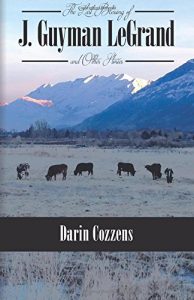 Darin Cozzens. The Last Blessing of J. Guyman LeGrand and Other Stories. Zarahemla Books.
Darin Cozzens. The Last Blessing of J. Guyman LeGrand and Other Stories. Zarahemla Books.
In his second collection of short stories, Darin Cozzens returns to his fictional Balford, a little Wyoming town whose mostly Mormon inhabitants illustrate, over the last sixty years, the pains and ironies of what one character in the title story calls “normal mortality.” Bride-to-be Fonda Penroy struggles to reconcile judgment and compassion when a more popular cousin’s hastily arranged wedding upstages her own. A washtub at a farm auction is catalyst for the motives and emotions of half a dozen different characters. Sitting at the bedside of her dying twin brother, eighty-four-year-old Ivy Teague must confess a long-held and most unlikely grudge. And on his way to tell a farm couple that their livelihood is no longer “a paying proposition,” banker Frett Maxwell Jr. can’t help but question his dead father’s philosophy regarding the gamble of life. All together, whatever the predicament of their central figures, these eight stories evoke the poignancy of regret, forgiveness, and, ultimately, redemption.
Darin Cozzens grew up in Ralston, Wyoming. He earned a B.A. from Brigham Young University, an M.F.A. from the University of North Carolina–Greensboro, and a Ph.D. from Oklahoma State University. His stories have appeared in Greensboro Review, Cimarron Review, Weber Studies, River Oak Review, and Irreantum. He has received AML Award Honorable Mentions two times. He teaches at Surry Community College in Dobson, North Carolina.
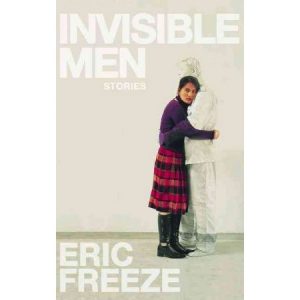 Eric Freeze. Invisible Men. Outpost19.
Eric Freeze. Invisible Men. Outpost19.
In his latest collection of short fiction, Eric Freeze puts his breathtaking talent in service of witty and heartbreaking storytelling. This is a dazzling mix that feels remarkably effortless, from “The Virgins” (an homage to Rick Moody) to the formally innovative (“Mr. America”). A wild fabulist strain runs throughout, from “The Ice Woman” to “The Invisible Invisible Man,” in which a pair of overalls keeps a husband out of sight. Following his award-winning Hemingway on A Bike, Freeze continues to hit his stride.
Eric Freeze is author of the short story collection Dominant Traits (Dufour, 2012), a collection of creative nonfiction Hemingway on a Bike (University of Nebraska Press, 2014, AML Award), and the short story collection Invisible Men. He is the recipient of a Canada Council for the Arts grant for work on a novel. He has published stories, essays, and translations (French to English) in numerous periodicals including Boston Review, Harvard Review, and The Southern Review. He teaches creative writing at Wabash College and in Butler University’s MFA program. He lives in Crawfordsville, Indiana and Nice, France.
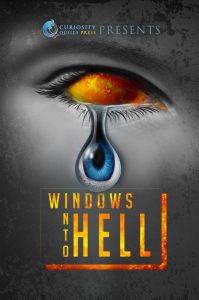 Various authors. Windows into Hell. Curiosity Quills Press. Edited by James Wymore. Post-life short story anthology, inspired by the Steven Peck novel A Short Stay in Hell. Contributions by James Wymore, Michaelbrent Collings, Michael R. Collings, Mette Ivie Harrison, Jay Wilburn, Tonya Adolfson, R.A. Baxter, D.J. Butler, Sarah E Seeley, and Steven L Peck.
Various authors. Windows into Hell. Curiosity Quills Press. Edited by James Wymore. Post-life short story anthology, inspired by the Steven Peck novel A Short Stay in Hell. Contributions by James Wymore, Michaelbrent Collings, Michael R. Collings, Mette Ivie Harrison, Jay Wilburn, Tonya Adolfson, R.A. Baxter, D.J. Butler, Sarah E Seeley, and Steven L Peck.
What happens after we die? Mankind has speculated through the ages that a few righteous or lucky people go straight to heaven. Or so we’ve come to believe. Good or bad, our journey doesn’t end at death. For most of us, the afterlife begins in an office where an overworked and underappreciated demon decides our long term fate. Life is messy, it’s easy to miss one of the crucial lessons. In order to accommodate our unique shortcomings, a myriad of custom fitted Hells wait with open arms to teach us. No cliché fire and brimstone here, except as decorations. Besides, that would be the easy way out. Yes, there is a way out. All you have to do is learn one simple lesson. That shouldn’t be too hard, right? Windows into Hell explores what awaits a few people when their life inevitably comes to an end. Featuring bestselling and award winning authors, these stories delve into humanity’s greatest fears- death and the fate of our immortal souls.
Short Fiction
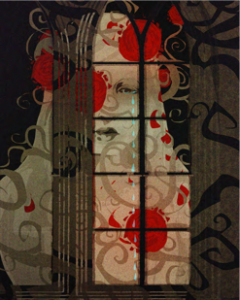
Emily Belanger, “And Thorns Will Grow There” Sunstone #180, Spring 2016.
Emily Belanger is a doctoral candidate at the University of Georgia in Athens, GA, where she lives with her husband. When she isn’t teaching, writing, or fending off Southern scorpions, she reads every fairy tale she can find. “And Thorns Will Grow There” took second place in the 2015 Sunstone Fiction Contest.
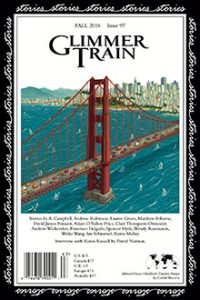 Spencer Hyde, “Light as Wings” Glimmer Train. Fall 2016, #97.
Spencer Hyde, “Light as Wings” Glimmer Train. Fall 2016, #97.
Spencer Hyde’s nonfiction can be found in Hobart, The Pinch, Word Riot, and Sweet, and his short humor has appeared in McSweeney’s Internet Tendency. He holds an MFA in Fiction from Brigham Young University. Spencer is currently pursuing a PhD at University of North Texas, where he is working on a collection of short stories about birds and the awesome power of recall. He edits for elsewhere mag. He won the 2015 AML Short Fiction Award.

Heidi Naylor, “The Mandelbrot Set” Sunstone Magazine, #182, Fall 2016
Heidi Naylor’s fiction and features have appeared in the Washington Post, the Jewish Journal, the Idaho Review, New Letters, and other magazines. She teaches English at Boise State University. This story won first place in the 2015 Sunstone Fiction Contest.
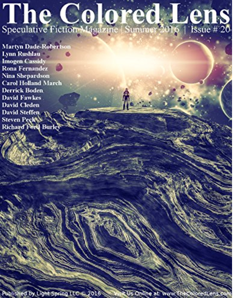 Steven L. Peck. “Incomplete Slaughter“ The Colored Lens, Summer 2016.
Steven L. Peck. “Incomplete Slaughter“ The Colored Lens, Summer 2016.
Steven L. Peck is Associate Professor in the Biology Department of Brigham Young University where he teaches The History and Philosophy of Biology and Bioethics. His creative works include the magical realism novel, The Scholar of Moab, published by Torrey House Press won the 2011 AML Novel Award and was a Montaigne Medal Finalist. His story “Two-Dog Dose” won the 2014 AML Short Fiction Award. His existential horror, A Short Stay in Hell, published by Strange Violin Editions is currently being made into a full-length feature film by Wandering/Cut Films.
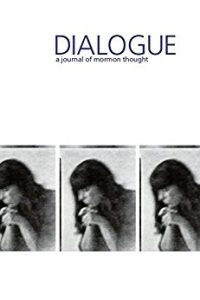 Levi S. Peterson. “Kid Kirby” Dialogue: A Journal of Mormon Thought, 49:2, Summer 2016.
Levi S. Peterson. “Kid Kirby” Dialogue: A Journal of Mormon Thought, 49:2, Summer 2016.
Levi S. Peterson is a retired professor of English presently living in Washington state. He is the author of many essays and stories on Mormon themes. He is the author of two collections of stories, The Canons of Grace and Night Soil; two novels, The Backslider and Aspen Marooney; a biography, Juanita Brooks: The Life Story of a Courageous Historian of the Mountain Meadows Massacre; and an autobiography, A Rascal by Nature, A Christian by Yearning. He is a five-time AML Award winner, as well as being given an AML Honorary Lifetime Membership and the 2009 Smith-Pettit Foundation Award for Outstanding Contribution to Mormon Letters.
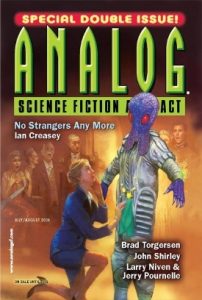 Brad R. Torgersen. “Purytans” Analog: Science Fact and Fiction, July/Aug 2016. Novella.
Brad R. Torgersen. “Purytans” Analog: Science Fact and Fiction, July/Aug 2016. Novella.
Brad R. Torgersen is a healthcare computer geek by day, a United States Army Reserve Chief Warrant Officer on the weekend, and a speculative fiction writer by night. Award-winning and award-nominated, he is a regular in the pages of Analog magazine, and has published numerous pieces of short fiction in other venues such as Mike Resnick’s Galaxy’s Edge magazine and Orson Scott Card’s InterGalactic Medicine Show magazine. Brad has published a novel, The Chaplain’s War and two short story collections, Lights in the Deep and Racers of the Night. His story “The Chaplain’s Legacy” won the 2013 AML Short Fiction award.

I should note that James Wymore’s collection, WINDOWS INTO HELL, also includes my poem-story, “Egress from Hell.” Perhaps the similarity between my name–Michael R. Collings–and my son’s presented some confusion. I am grateful to James for taking a chance on “Egress”–there aren’t many stories out there quite like it.
Sorry about that, I fixed it to include your name.
Thanks.